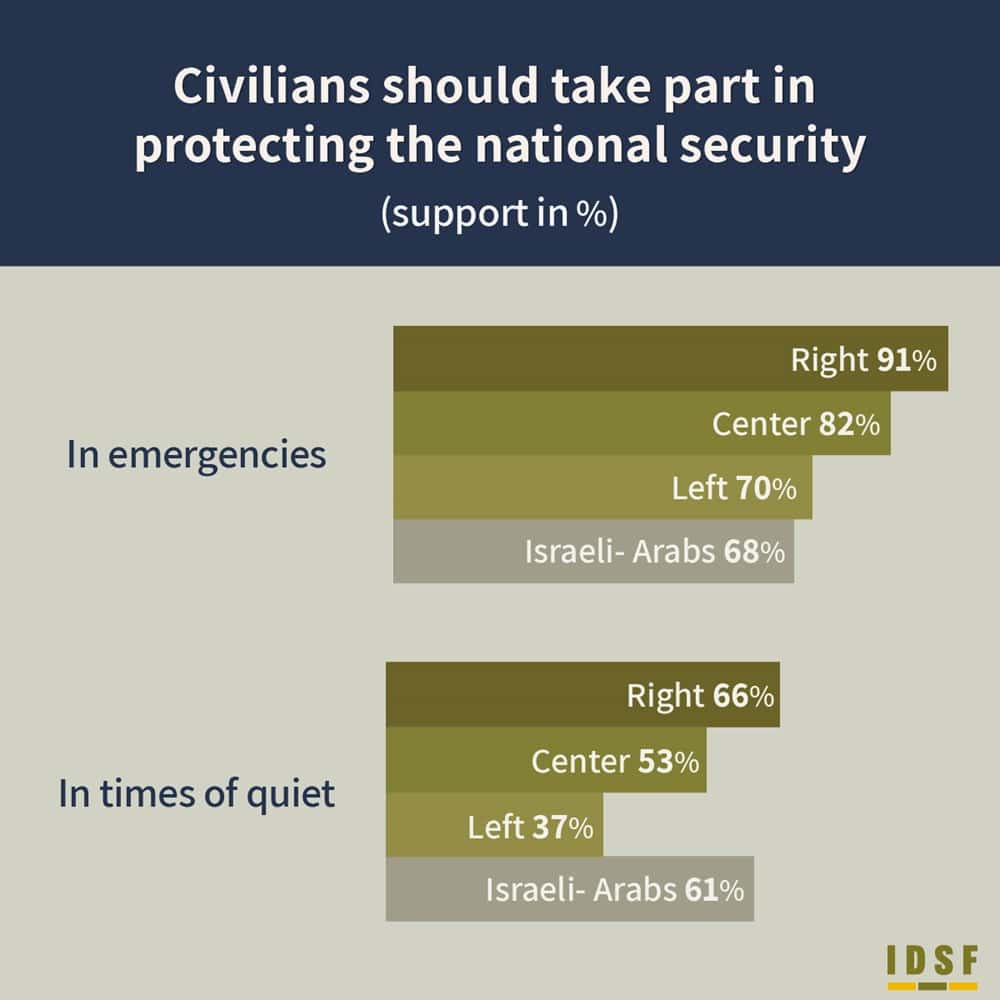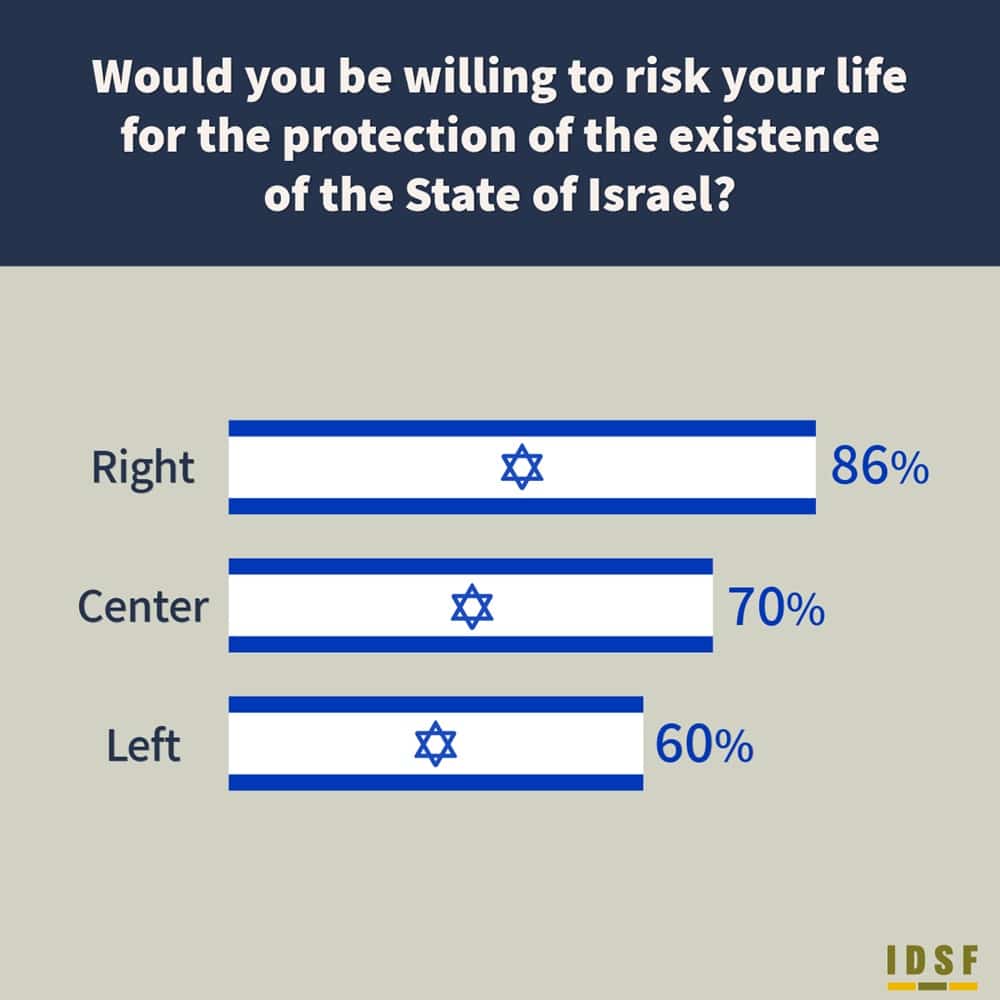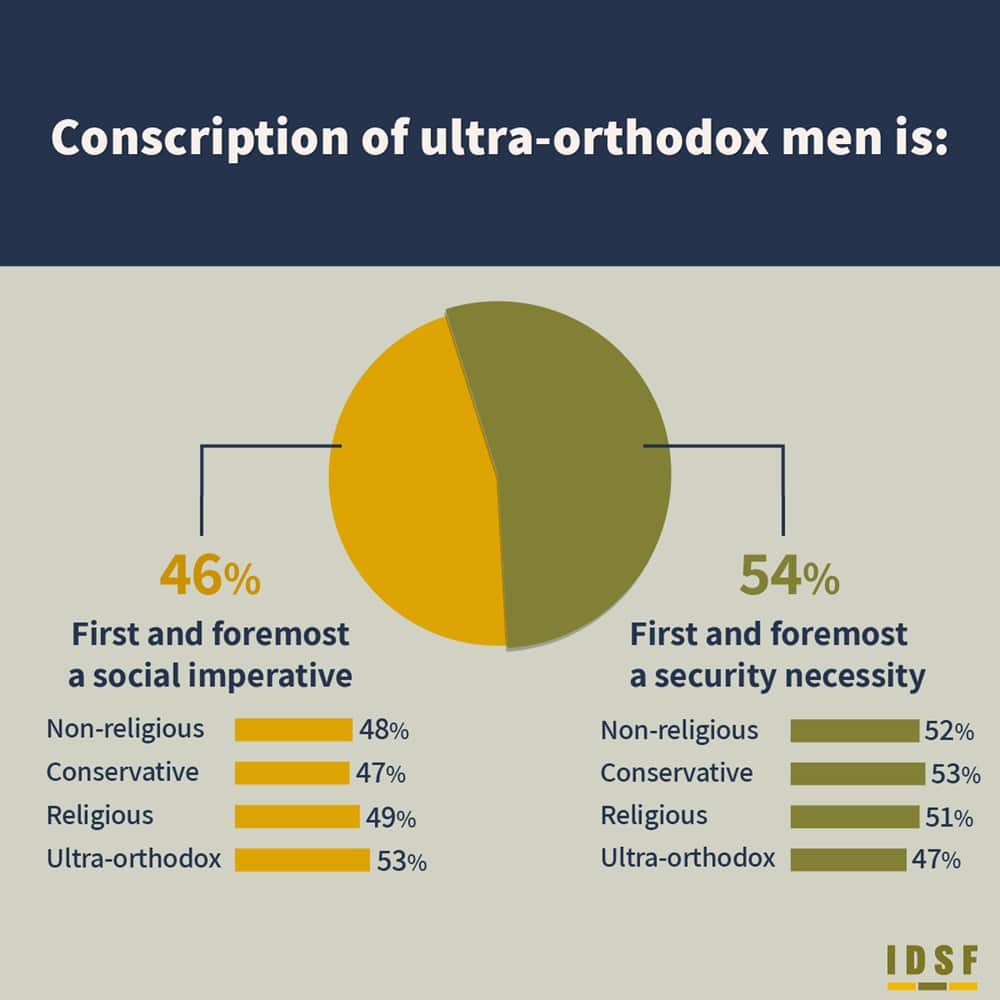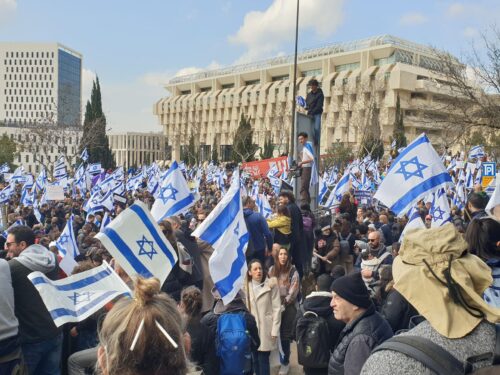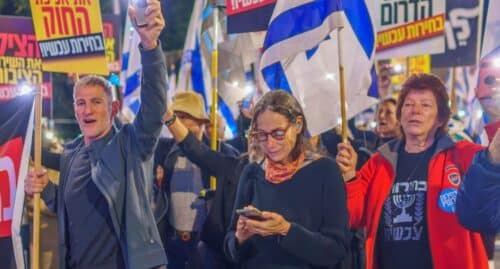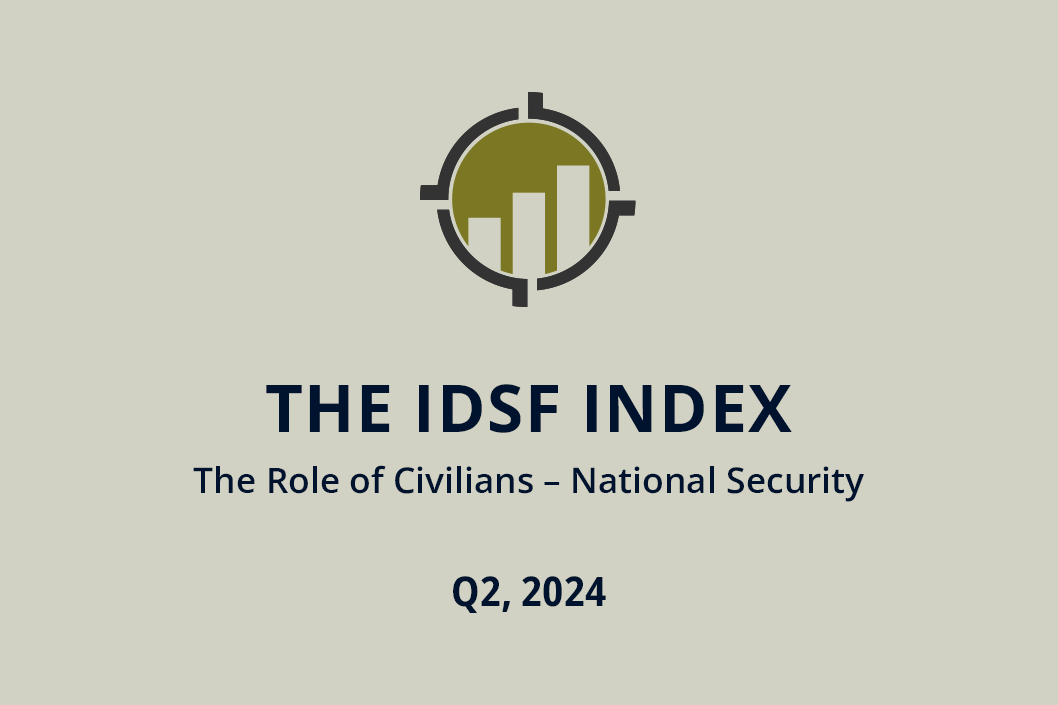
As part of the IDSF HaBithonistim Index project, an ongoing survey of Israeli society on questions of security, military and society, this month’s report explores an issue that has become the focus of attention in Israel following the events of October 7: the role of Israel’s civilians in the country’s national security strategy.
The results of the survey and analysis thereof will be shared in a three-part report. The present part focuses on the perception of Israel’ society regarding its role in the national security, in times of quiet and during military emergencies. It further explores the public opinion as regards to the conscription of Haredi (ultra-orthodox) Israelis and the role of Israel’s youth in contributing to the country’s security. The next sections of the report take a closer look at Israel’s settlement, agriculture and industry enterprises and their contribution to the national security.
The survey was conducted on May 2024, under the statistical direction of Dr. Hagai Elyakim. It included 1,453 participants from Israel’s internet-using adult population (18+) and was sampled in a manner that ensured its representativeness in terms of age, gender, nationality, religion and political affiliation.
For the combined sample (1,453 respondents), the maximum margin of error is ±2.6% with a 95% probability; For the Jewish sample (1,079 respondents), the maximum margin of sampling error is ±3% with a 95% probability; For the Arab sample (374 respondents), the maximum margin of error is ±5.1% with a probability of 95%.
Would you risk your life for the country? Most citizens are willing to do so
In the first part of the survey, the participants were presented with a series of questions aiming to determine the extent to which they thought Israel’s civilian population should take an active part in the protection of the country’s security. 81% of the respondents thought that in security emergency times the civilian population should play an active role in the protection of the country; 58% thought that the civilian population should do so as a matter of routine. A distribution of the responses according to nationality and ideology shows significant variance: 91% of the respondents affiliated with the political right thought that civilians must partake in the protection of the nation’s security in times of war while 66% of that group thought that this should extend to times of quiet as well; Of the respondents in the center of the political map, 82% maintained that civilians should be involved in national security in times of war while 53% supported this for times of quiet as well; On the left of the political map, 70% of the respondents thought civilians should be actively involved in national security in times of war while only 37% thought this should extend to times of quiet as well. As for the Israeli-Arab respondents – 68% thought that civilians should be involved in national security during war and 61% maintained this involvement should include times of quiet.
A marked variance is evident when comparing the perception among the Jewish and the Arab respondents regarding civilian involvement in national security in times of war as compared with times of quiet, as the survey shows that Israeli-Arabs place more importance on this role as compared to the political center and left-wing Jewish respondents.
The participants were also asked whether they would be willing to risk their lives protecting the country. 71% of the respondents replied affirmatively, yet here too, there are noticeable differences between the ideological groups – 86% of the right-wing respondents would risk their lives for their country as oppose to 70% from the political center and 60% of the left-wing respondents.
The participants were then asked whether they thought Israel should instate a national guard comprised of army veterans for the purpose of maintaining Israel’s internal security. 63% of the respondents responded positively to the idea, again, with significant variance between ideological affiliation: 86% of the political right supported the idea as oppose to 50% of the center and 31% of the left.
From studying Torah to military reserves service: the activities that contribute to Israel’s security
The survey participants were asked to tick any activities on a list that they thought contribute to Israel security. The leading choice was “military reserves service” with an overall 88% support, followed closely by “volunteering in community security teams” at 86% and by “regular compulsory military service” at 84%. Further down the list were “police volunteering” at 73%, “possession of a licensed firearm” at 62% and “National Service” (voluntary alternative to army service) – at 58%. At the bottom of the table was “studying the Torah” with only 35% of the respondents thinking this is material for the security of Israel.
A segmentation according to religious affiliation shows a broad consensus regarding the first three items. Non-religious, Conservative, orthodox and ultra-orthodox (Haredi) respondents all thought that military reserves service, volunteering in security teams, and regular compulsory military service are vital to the security of Israel. However, regarding the studying of the Torah, there were considerable variances among the religious affiliation segments: among the non-religious respondents, only 12% thought that the studying of the Torah is material for Israel’s security; among the Conservative respondents 48% thought so; among the orthodox – 73% and among the Haredi – 96% supported this claim.
The majority of the public would like to see a more Zionistic and involved youth
The present IDSF HaBithonistim index explores the perception in the Israeli public in of the role the youth should play in national security. 56% of the respondents thought that young adults in Israel should take an active role in the protection of the country’s security – both in times of war and quiet. A distribution of the replies shows an interesting picture: while Jews and Arabs hold similar positions of the subject – 56% and 57% respectively, an ideological distribution shows a significant variance: 69% of the right-wing respondents supported this statement as oppose to 44% of the respondents from the center and 28% of the left of the political map.
The respondents were asked whether they thought there should be leadership groups comprised of reservists and youths within Israel’s border communities. 67% of the respondents responded positively but here, too, there was a notable variance between the ideological groups: 82% of the right-wing respondents supported this idea, while 58% of the center and 42% of the left-wing respondents supported this.
In the context of Israeli youth, the respondents were posed with questions concerning school education. For example, they were asked whether the educational curriculum should include more Zionism studies and ideological encouragement to serve the country. 77% of the Jewish respondents supported this notion as oppose to 32% of the Israeli-Arab respondents. A distribution of the Jewish respondents by ideology and religion shows that those agreeing most with this statement were the Conservative and orthodox right-wing respondents. The respondents who tended not to agree with this statement were from the non-religious, Haredi and left-wing segments of the participants.
the participants were further asked whether they thought Israel needs a new youth movement that will be founded on the values of Zionism and national security. 54% of the Jewish respondents supported this idea, as compared with only 28% of the Israeli-Arab respondents. Of the right-wing respondents, 69% supported this idea whereas 36% of the center and 27% of the left-wing respondents thought so. All in all, 48% of all the participants supported the idea of founding a new youth movement that promotes Zionism and security.
Drafting of ultra-orthodox – first and foremost a security imperative
What about the brewing controversy over the conscription of Haredi (ultra-orthodox) men into the IDF? 56% of the respondents thought that the solution for the need to increase recruitment rates lies within Haredi society, however, 59% state that the conscription of Haredi men must be done in tandem with the recruitment of additional demographic groups that do not serve in the IDF.
The Jewish and Arab participants differ in their standing on these two issues – 52% of the Jewish respondents agreed that the need to increase the rate of enrollment in the army must find its solution in the Haredi community; 62% of the Jews and 47% of the Arab respondents thought that the recruitment of Haredi men must come in tandem with the recruitment of other non-serving populations. The variance between the two groups probably stems from the fact that as a whole, the Arab population in Israel does not serve in the IDF.
Ideologically, there is a variance among the groups: among the right-wing respondents, 40% thought that the army should recruit from the Haredi community; among the center affiliated respondents, 63% thought so, and among the left-wing respondents – 78% supported this statement. The question whether other non-serving population should be drafted yielded similar results. Hence, it appears that the majority of the Jewish population in Israel believes that non-serving groups should be recruited to the army.
Finally, the participants were asked to choose one of two options to the question whether the conscription of Haredi men is a social imperative or a security necessity. The results were very close, however, most of the public (54%) thought it was a security necessity. The variance of the political and religious distribution is within the statistical margin of error.
The bottom line: the public wants to be more involved in Israel’s security
Despite the variances among the different ideological and religious groups, it seems that as a whole, the Israeli public maintains that citizens have a great importance in the national security strategy, predominantly in times of emergency but also in times of quiet. Israel’s public believes that the country’s youth should be given an active role in the protection of the State, and agrees that this should be incorporated into the formal and non-formal education.
As regards to the question of the conscription of ultra-orthodox (Haredi) men, the survey found variances among the various groups of Israeli society. It appears that most of the public supports the conscription of Haredi men but maintains that this conscription should extent to other non-serving groups as well.
“Already from the inception of Zionism, the need was clear for the involvement of the civil population in Israel’s national security, alongside the compulsory military service”, says IDSF HaBithonistim Director, Brig. Gen. (res.) Amir Avivi. “In the past, the civil guards were part and parcel of the State’s reality, however, throughout the years this has fallen by the wayside. In the wake of Operation Guardian of the Walls in 2021, and in full force since the October 7 attacks, the public has been revisiting the importance of civilian involvement in the country’s protection – a fact that is clearly reflected in the security squads every town and community in Israel now have. The findings of this survey show that we are returning to the basic values that were a given in the State’s formative years, and reflect to what extent the public in Israel can, must and is willing to contribute and sacrifice for the national security and the protection of our national home”.

